David Bowles, Traci Sorell, and others present poems about young activists who speak up to fight global climate change.
social justice
Does My Body Offend You?
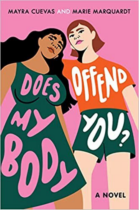
A timely story of two teenagers who discover the power of friendship, feminism, and standing up for what you believe in, no matter where you come from.
Aaalligator!
When a hungry alligator moves to their town, the residents want him out . . . until they get to know him (and learn what he’s actually hungry for!). A timely tale about empathy, acceptance and a community’s response to injustice.
The International Day Of The Girl: Celebrating Girls Around The World
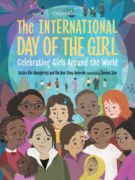
This introduction to the International Day of the Girl and its worldwide significance encourages children to recognize their own potential to make change, providing both a perfect lesson in social justice and a celebration of girl power.
Hector; a boy, a protest, and the photograph that changed apartheid
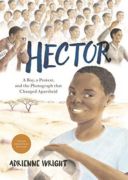
On June 16, 1976, Hector Pieterson, an ordinary boy, lost his life after getting caught up in what was supposed to be a peaceful protest. Black South African students were marching against a new law requiring that they be taught half of their subjects in Afrikaans, the language of the White government. The story’s events unfold from the perspectives of Hector, his sister, and the photographer who captured their photo in the chaos. This book can serve as a pertinent tool for adults discussing global history and race relations with children. Its graphic novel style and mixed media art portray the vibrancy and grit of Hector’s daily life and untimely death. Heartbreaking yet relevant, this powerful story gives voice to an ordinary boy and sheds light on events that helped lead to the end of apartheid.
A Wish In The Dark
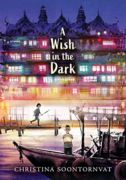
A boy on the run. A girl determined to find him. A compelling fantasy looks at issues of privilege, protest, and justice.
All light in Chattana is created by one man — the Governor, who appeared after the Great Fire to bring peace and order to the city. For Pong, who was born in Namwon Prison, the magical lights represent freedom, and he dreams of the day he will be able to walk among them. But when Pong escapes from prison, he realizes that the world outside is no fairer than the one behind bars. The wealthy dine and dance under bright orb light, while the poor toil away in darkness. Worst of all, Pong’s prison tattoo marks him as a fugitive who can never be truly free. Nok, the prison warden’s perfect daughter, is bent on tracking Pong down and restoring her family’s good name. But as Nok hunts Pong through the alleys and canals of Chattana, she uncovers secrets that make her question the truths she has always held dear.
A Wish In The Dark is featured in A Dozen Books on Activism.
Indian No More
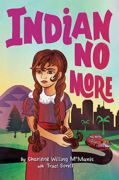
Regina Petit’s family has always been Umpqua, and living on the Grand Ronde reservation is all 10-year-old Regina has ever known. Her biggest worry is that Sasquatch may actually exist out in the forest. But when the federal government signs a bill into law that says Regina’s tribe no longer exists, Regina becomes “Indian no more” overnight–even though she was given a number by the Bureau of Indian Affairs that counted her as Indian, even though she lives with her tribe and practices tribal customs, and even though her ancestors were Indian for countless generations. With no good jobs available in Oregon, Regina’s father signs the family up for the Indian Relocation program and moves them to Los Angeles. Regina finds a whole new world in her neighborhood on 58th Place. She’s never met kids of other races, and they’ve never met a real Indian. For the first time in her life, Regina comes face to face with the viciousness of racism, personally and toward her new friends. Meanwhile, her father believes that if he works hard, their family will be treated just like white Americans. But it’s not that easy. It’s 1957 during the Civil Rights Era. The family struggles without their tribal community and land. At least Regina has her grandmother, Chich, and her stories. At least they are all together.
The Bridge Home
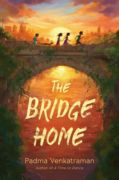
Four determined homeless children make a life for themselves in Chennai, India.
The Bridge Home was our WOW Recommends: Book of the Month for October 2019 and also featured our August 2019 My Take/Your Take, June 2020 My Take/Your Take, and July 2020 My Take/Your Take.
The Old Man
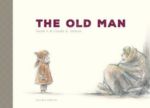
Day breaks over the town. Get up, everybody! It’s time to go to school. For the old man too, it’s time to wake up. The night was icy and he’s hungry. His name? He doesn’t know . . . This is the story of a person with no job, no family, no home, a nobody, who can’t even remember what he was once named. But his day changes when he is noticed by a child. Drawn in soft, watercolor pencil, this is an important story for our times. This gentle, compelling book will appeal to a child’s sense of justice and to every reader’s compassion.
Mama Africa!
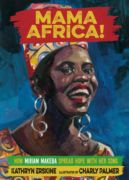
Miriam Makeba, a Grammy Award–winning South African singer, rose to fame in the hearts of her people at the pinnacle of apartheid―a brutal system of segregation similar to American Jim Crow laws. Mama Africa, as they called her, raised her voice to help combat these injustices at jazz clubs in Johannesburg; in exile, at a rally beside Dr. Martin Luther King, Jr.; and before the United Nations.
